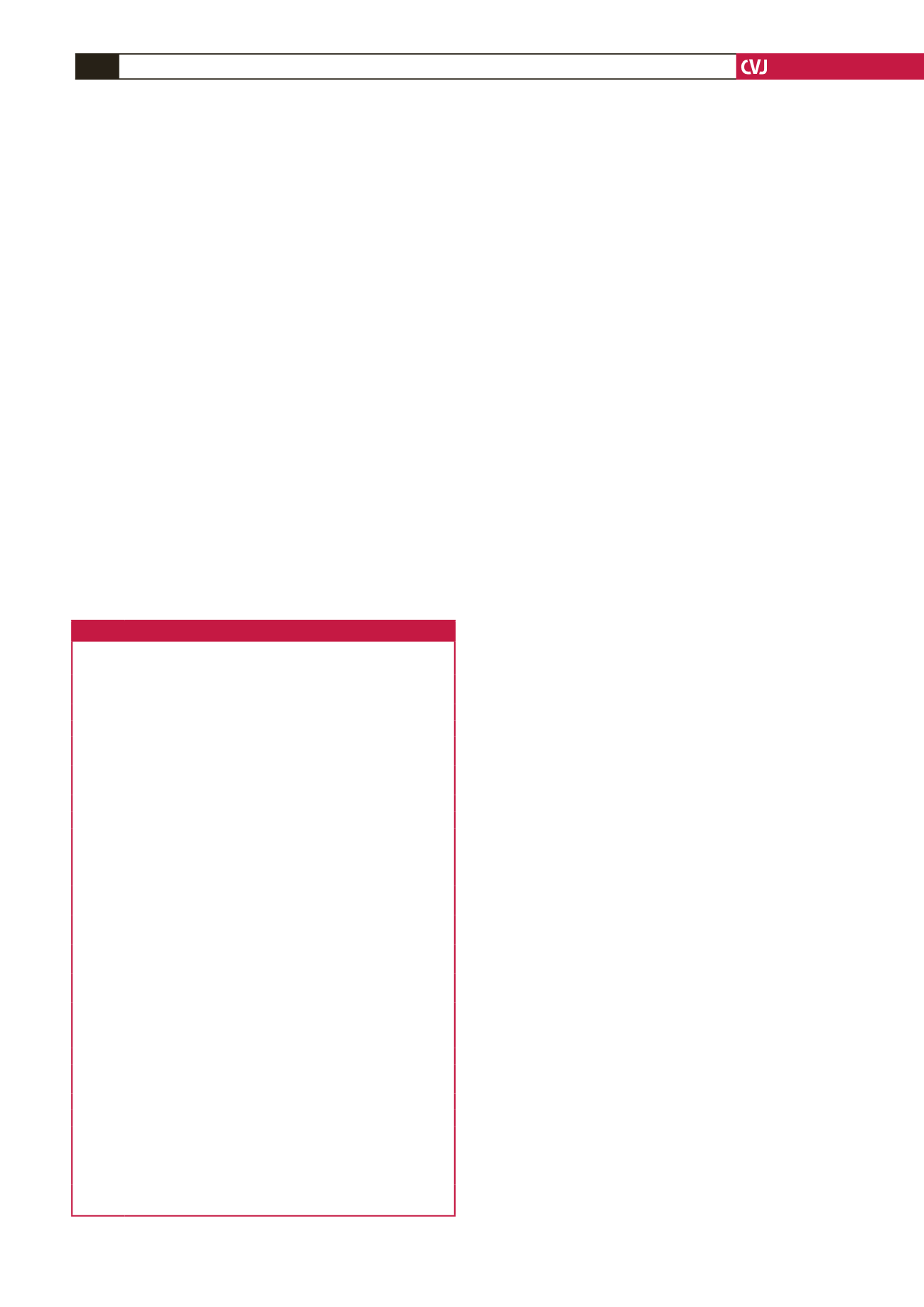

CARDIOVASCULAR JOURNAL OF AFRICA • Volume 28, No 6, November/December 2017
398
AFRICA
Both under- and overweight pose a risk to the mother
and child during and after birth.
10
It is therefore important to
carefully manage weight gain during pregnancy with dietary
intake of a sufficient level to ensure proper foetal nutrition,
11
but avoiding excessive maternal weight gain. The use of lifestyle
interventions to attenuate such weight gain during pregnancy has
been the focus of many studies in the developed world, with a
recent systematic review of 88 studies, involving 182 139 women,
showing that maternal weight control during pregnancy via diet,
exercise or a mix of these methods is safe and improves both
maternal and foetal outcomes.
12
However, no similar analysis of
such data from the developing world is currently available.
The health risks of maternal obesity and excessive gestational
weight gain to the mother and baby pose significant demands
on the healthcare system, with an increased need for additional
resources in both primary and secondary care settings.
11,13
This
is particularly true in developing countries where insufficient
resources exist to meet these extra demands on the public
health system, and where obesity is already prevalent. It is
therefore important to develop cost-effective interventions to
reduce maternal obesity in such environments. In an attempt to
determine the effectiveness of maternal lifestyle interventions in
resource-limited environments, we conducted a systematic review
of the literature on weight-management protocols for pregnant
females, undertaken in developing countries.
Methods
Five electronic databases were searched; these included Public/
Publisher MEDLINE (PubMed), SCOPUS, a bibliographic
database containing abstracts and citations for academic
journal articles, Biomed Central, the Cochrane Library and the
Cumulative Index to Nursing and Allied Health (CINHAL).
Twenty-four search terms, with varying combinations,
encompassing pregnancy, obesity/overweight, diet/nutrition,
physical activity and developing countries (Table 1), were used.
The search included all articles published up to 4 December
2013. No filters were set, in order to obtain articles in all
languages and all types of documents.
Randomised, controlled trials (RCTs), case–control studies
and cohort studies that were performed in developing countries
and which investigated overweight/obesity in pregnant women
and/or lifestyle interventions during pregnancy were considered
eligible. Investigations performed in developing countries and
the following types of studies were not eligible for inclusion:
reviews, position statements/guidelines, reports, epidemiological
studies, observational studies and prevalence studies.
The literature search was performed independently by two
authors, Shelley Macaulay (SM) and Estelle Watson (EW). The
search results obtained from each of the five electronic databases
were pooled and duplicates were removed. At the first step, titles
were screened for eligibility. Following this, the abstracts of those
that were considered eligible were then obtained and read. Full-
text articles of the abstracts that fulfilled the inclusion criteria
were then obtained and read. In addition, the reference lists
of appropriate full-text articles were hand-searched for further
relevant articles.
Data were extracted from the full-text articles by four of
the reviewers: Phillipe Gradidge (PG), Elena Libhaber (EL),
EW and SM. For each included article, data were extracted for
country, region, sample size, gestational age, BMI, intervention
details and outcomes.
The quality of each included article was assessed by three
authors (EW, PG and EL) using the Cochrane Risk of Bias
Tool (Cochrane, 2011). In accordance with the risk-assessment
checklist, each study was assessed on: sequence generation,
allocation concealment, blinding, incomplete outcome data,
selective outcome reporting and other threats to validity.
The studies were classified as being good, average or poor
quality based on how many of the above criteria were met.
Good-quality articles met five or more of the above criteria,
average-quality articles met three to four of the above criteria,
and poor-quality ones met less than three of the above criteria.
Results
A total of 6 988 records were identified from the five databases,
after which 5 280 duplicates were removed. The title screen
therefore involved 1 708 articles, of which 73 were considered
appropriate, and their abstracts were obtained and reviewed.
After reviewing the abstracts, 23 full-text articles were obtained
and read. In addition, the bibliography of the full-text articles
were hand-searched for further appropriate articles. Six additional
articles were obtained through hand-searching. Together with
the hand-searched articles, a final total of seven articles were
considered eligible for this systematic review. Articles that were
excluded at this stage were those conducted in high-income
Table 1. Search terms
Search 1 Pregnancy AND obesity AND diet AND developing countries
Search 2 Pregnancy AND obesity AND nutrition AND developing countries
Search 3 Pregnancy AND obesity AND physical activity AND developing
countries
Search 4 Pregnancy AND obesity AND exercise AND developing countries
Search 5 Pregnancy AND overweight AND diet AND developing countries
Search 6 Pregnancy AND overweight AND nutrition AND developing
countries
Search 7 Pregnancy AND overweight AND physical activity AND developing
countries
Search 8 Pregnancy AND overweight AND exercise AND developing countries
Search 9 Pregnancy AND obesity AND diet AND middle-income countries
Search 10 Pregnancy AND obesity AND nutrition AND middle-income
countries
Search 11 Pregnancy AND obesity AND physical activity AND middle-income
countries
Search 12 Pregnancy AND obesity AND exercise AND middle-income
countries
Search 13 Pregnancy AND overweight AND diet AND middle-income
countries
Search 14 Pregnancy AND overweight AND nutrition AND middle-income
countries
Search 15 Pregnancy AND overweight AND physical activity AND middle-
income countries
Search 16 Pregnancy AND overweight AND exercise AND middle-income
countries
Search 17 Pregnancy AND obesity AND diet AND low-income countries
Search 18 Pregnancy AND obesity AND nutrition AND low-income countries
Search 19 Pregnancy AND obesity AND physical activity AND low-income
countries
Search 20 Pregnancy AND obesity AND exercise AND low-income countries
Search 21 Pregnancy AND overweight AND diet AND low-income countries
Search 22 Pregnancy AND overweight AND nutrition AND low-income
countries
Search 23 Pregnancy AND overweight AND physical activity AND low-income
countries
Search 24 Pregnancy AND overweight AND exercise AND low-income
countries

















